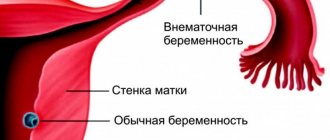Menstruation is periodically occurring bleeding from the female genital organs, associated with the removal from the body of an unfertilized egg along with the uterine epithelium. If the egg has been fertilized, then pregnancy occurs, but menstruation does not occur.
A healthy woman gets her period at regular intervals. The time interval between each onset of menstruation is called the menstrual cycle. The following indicators are typical for a normal menstrual cycle:
- The duration of the menstrual cycle is from 21 to 35 days, which depends on the individual characteristics of the body.
- The duration of menstruation is from 3 to 7 days.
- The volume of discharge during bleeding is from 50 to 150 ml.
- Heaviness in the lower abdomen, weakness, irritability, mood swings.
These normal indicators are determined by modern medicine. But, unfortunately, many girls experience various abnormalities in their cycle. A fairly common deviation is long menstruation, when menstruation lasts 10 days or even more. Why is this happening? When should you worry? What to do to restore a normal cycle? We'll talk about this in this article.
Video on the topic (normal periods):
https://youtu.be/W71T7kopdlQ
The reasons that menstruation lasts more than 10 days are divided into physiological (explained by natural processes in the girl’s body and not considered a pathology) and pathological (caused by some disease). Let's look at all these reasons in more detail.
Childbirth
Pregnancy is a complex process in which a complete restructuring of hormones and the activity of the reproductive system occurs. With the birth of a baby, a woman’s body begins to restore its former functions. After the placenta is separated, recovery of the uterus takes 9–10 days. During the first week, a woman experiences heavy bleeding called lochia. By the end of 6 weeks, the discharge stops.
If the baby is breastfed, then active production of prolactin occurs, which blocks the functioning of sex hormones. Menstruation resumes after breastfeeding stops.
Sometimes menstruation occurs during pregnancy and can last for more than 10 days. In this case, you should seek help from your gynecologist. Such a malfunction in a woman’s body may be a signal of a threat of miscarriage.
Why does my period take so long?
An increase in the duration of menstrual flow is possible under the influence of external and internal factors. A situation in which menstruation takes a very long time can arise due to the following external reasons:
- prolonged stress;
- nervous exhaustion;
- intoxication of the body;
- strict dietary restrictions;
- alcohol abuse, smoking;
- change in climatic conditions.
With the normalization of the psychological and physical state, the duration of menstruation is normalized. But menstruation may not end on time due to disruptions in the functioning of the body. It is necessary to check the functioning of the reproductive, endocrine, and hematopoietic systems.
Important! Depending on the reason why your periods no longer end on time, their duration changes.
Why do my periods go on for a month and never end?
In cases where menstruation does not end, the duration of discharge has already reached 30 days, an urgent consultation with a gynecologist is necessary. Possible reasons include:
- hormonal dysfunction;
- endocrine pathology;
- use of sedatives;
- sudden weight loss;
- nervous fatigue.
To establish the exact cause, it is necessary to undergo a comprehensive examination, do an ultrasound, donate blood for hormones that regulate the functioning of the reproductive system, and thyroid hormones. It is necessary to check whether neoplasms have appeared: they can be either benign or malignant.
Attention! If your period lasts a month, then there is a risk of developing anemia and deteriorating general health.
My period lasts 3 weeks
The causes of prolonged periods must be clarified together with a gynecologist. Among the most common factors influencing the duration of menstrual flow are:
- hormonal disorders;
- blood diseases;
- adenomyosis, endometriosis;
- benign, malignant tumors;
- malfunctions of the thyroid gland.
The gynecologist can determine the presumptive cause of the disorders after examination and medical history. But for an accurate diagnosis it is necessary to donate blood and undergo an ultrasound examination.
Why does my period last 2 weeks?
The reasons why periods take a long time can be determined after a comprehensive examination. Menstruation does not end on time in those patients who:
- hormone balance is disturbed;
- endometriosis or adenomyosis has been identified;
- there were problems with the functioning of the blood coagulation system;
- uterine fibroids;
- oncological diseases of the reproductive organs.
In cases where the discharge does not end on time, it is not enough to take hemostatic tablets. You can prevent your health from deteriorating if you establish the cause of the pathology and begin treatment immediately.
Your period lasts 12 days
If menstruation does not end and continues for 12 days, then this condition cannot be left to chance. An increase in the duration of critical days is possible under the influence of external or internal factors.
It is important to make sure that there are no disturbances in the functioning of the endocrine and hormonal systems. Gynecologists recommend checking the functioning of the blood coagulation system and doing an ultrasound. Ultrasound examination can identify signs of adenomyosis, endometriosis, polyps in the uterus, ovarian cysts and various neoplasms in the pelvic area.
Your period lasts 11 days and never ends.
Patients who continue to have bleeding for more than 10 days should see a gynecologist. Continuing menstruation can lead to poor health. The doctor should prescribe hemostatic therapy and refer the woman for examination. If you determine in a timely manner why your periods do not end and continue for more than 11 days in a row, you can avoid possible complications.
Your period lasts 10 days
Cases where a patient’s period ends only on the 10th day are grounds for a comprehensive gynecological examination. A one-time occurrence of this failure is possible under the influence of external factors, but if menstruation lasts for 10 days for several cycles in a row, then it is necessary to look for the cause of the disturbance.
Doctors recommend checking hormonal levels and doing an ultrasound of the reproductive organs.
Your period lasts 9 days
There are cases when menstruation does not end for 9 days. This length of critical days can be caused by diseases of the reproductive organs and disruption of the process of hormone production. Among the common reasons for an increase in the duration of menstruation to 9 days are the installation of an intrauterine device and the start of taking oral contraceptives.
What is the reason if your period lasts 8 days?
If your period does not end within 8 days, doctors advise you to start taking hemostatic agents. At the same time, you need to check your reproductive health and take blood tests. If pathologies are detected, treatment is prescribed. In cases where the gynecologist does not detect any abnormalities, it is recommended to undergo examination by an endocrinologist and hematologist.
Comment! In cases where long periods were observed in all female relatives, this is an individual characteristic of the body. But by day 8, the discharge should be spotty and scanty.
Your period lasts 7 days: is it normal or not?
If menstruation ends on the 7th day, then this is considered normal. But by day 7, discharge should be scanty. If the intensity of menstruation does not decrease, then an examination is required.
You should consult a doctor if prolonged periods are accompanied by unbearable pain, weakness, vomiting, and constant nausea. A large amount of clots or mucus should also alert you.
Your period lasts 6 days and never ends.
When menstruation does not end on day 6, you need to monitor your condition. If the abundance of discharge does not change from the first days of menstruation, then the doctor may recommend hemostatic medications. Starting from the 3-5th day of menstruation, their abundance should decrease noticeably.
Doctors do not recommend waiting for the natural end of critical days in cases where on the 6th day the pad is filled in 2-3 hours. If spotting is observed on day 6, then there is no cause for concern; it will end in the coming days.
Bad habits, taking medications, stress
It happens that a woman, quite healthy, regularly visits the doctor, but she is still bothered by her periods, which last for more than a week. Why does this happen? First of all, you should pay attention to your lifestyle.
- Bad habits, abuse of alcohol, coffee and even strong tea can cause cycle disruption.
- Lack of proper nutrition and lack of vitamins.
- Stress, lack of sleep, change of time zone or climate zone.
- Taking medications.
- Incorrectly selected oral contraceptives.
From all of the above, we can conclude that women’s health should not be neglected.
If you have a long period lasting more than 10 days, you should immediately go to the hospital and do all the necessary examinations.
Many diseases can be asymptomatic for a long time. Therefore, we need to listen to our body; it often gives us signals that it is important to learn to decipher.
Be healthy!
Treatment and preventive measures
After the examination, the gynecologist must prescribe treatment. It should be, in particular, aimed at stopping bleeding as quickly as possible. The following is usually prescribed:
- hormones;
- drugs to improve blood clotting;
- means for strengthening the walls of blood vessels;
- drugs for uterine contraction;
- food supplements and vitamins.
The patient must take prescribed medications under the strict supervision of a doctor. Self-medication is strictly prohibited. Even folk remedies should be taken after consultation with a specialist and only as part of complex therapy. This applies primarily to those cases where the problem is very serious and poses a threat to life.
Traditional medicine recipes
If the situation is not associated with serious pathologies, then you can reduce the duration of your periods using traditional medicine recipes.
For example, to reduce the duration of discharge or reduce its abundance, you can take a decoction based on horsetail. You need to take a tablespoon of herb and pour 0.5 liters of boiling water. The mixture should be infused for several hours in a dark place. Take a decoction of one tablespoon every two hours until the discharge becomes less abundant. After normalization of the process, take a spoon three times a day for prevention.
Often, for long periods, the doctor prescribes, in addition to the main therapy, a herbal mixture based on:
- oak bark;
- raspberries;
- yarrow;
- cinquefoil, etc.
You can assemble them yourself or purchase them separately at the pharmacy. To prepare the collection, take 20 g of each plant. One tablespoon of the mixture is poured into a glass of cooled boiled water and left for at least 4 hours. Then it is boiled and cooked for up to 10 minutes at low temperature. The decoction is filtered and taken several times during the day, half a glass. Treatment lasts about 5 days.
Heavy bleeding can be stopped with a mixture of shepherd's purse and nettle. You need to take 100 g of each plant and mix them. Take three large spoons of the mixture and pour three glasses of boiling water. Pour the contents into a saucepan and keep on low heat for half an hour with the lid closed, then strain the broth and divide it into three equal parts. If you wish, you can add a little honey to each serving; this will improve the taste of the product while maintaining its beneficial properties.
If you don't have a shepherd's purse, you can brew one nettle. It is purchased in dosed packets and each packet is infused in a glass of boiled water. But the effect of taking this remedy will not be as strong as taking the collection.
Useful tips
Traditional medicine cannot help in all cases. And if the bleeding is too profuse, then you should not wait, but call an ambulance. Before doctors arrive, your condition can be alleviated by the following methods:
- Take a horizontal position, keeping your legs above body level. You can place a cushion or pillow under them;
- You can reduce pain and reduce the intensity of discharge using a cold compress. You can place a cold water bottle, a bag of frozen food, or an ice bag on your stomach. This should be done very carefully, as there is a risk of frostbite in other internal organs;
- Before doctors arrive, you should drink plenty of fluids. It is recommended to drink sweet tea or plain water, avoiding sparkling water or juices;
- if the ambulance cannot arrive very quickly, and the bleeding is very severe and this negatively affects the woman’s condition, then you can give a hemostatic drug like Decinon or Vikasol.
After the ambulance arrives, the doctor will explain in detail what needs to be done next and what medications to take and in what quantity. There is a possibility that hospitalization may be required; for this it is recommended to pack a special bag and an insurance policy.
If your periods continue for a suspiciously long time (a week or more), and especially when they are accompanied by severe pain, profuseness and other uncomfortable sensations, you should not let the situation take its course. You cannot self-medicate; even traditional medicine should be taken only on the recommendation of a specialist and after a series of tests.
There is always a reason for long periods. If it is identified and eliminated in time, the woman’s condition will improve and the menstrual cycle will normalize. In any case, the problem cannot be ignored, otherwise the situation will only get worse and may pose a threat.
Consequences of heavy discharge
Because Menorrhagia is a symptom and consequence of the presence of any disorders in the organs of a woman’s reproductive system; if the cause that caused it is not identified and eliminated in a timely manner, one may encounter the following consequences of heavy bleeding:
- infertility;
- anemia;
- the emergence and development of the oncological process in the organs of the reproductive system;
- a significant decrease in a woman’s quality of life and temporary loss of her ability to work.
Causes
As a rule, long-term monthly causes can be different. Often long periods after a delay are explained by the following reasons:
- Unidentified menstrual cycle. Teenagers often experience long periods during puberty and menopause.
- Hormonal disbalance. The cycle can be changed due to various factors: stress or serious illness.
- Ovarian diseases. Often, ovarian diseases affect the regularity of the menstrual cycle. These can be various inflammatory processes, as well as neoplasms, cysts and polyps.
- Diseases of the endocrine system. Disorders of the thyroid gland can lead to disorders.
- Diseases of the uterus. Prolonged menstruation can occur with malignant tumors and fibroids.
- Use of hormonal medications.
- Use of an intrauterine device. Ladies who wear the IUD note that their periods have become longer and more painful.
This is not an exhaustive list, but the reasons presented are the most common.
Diseases of the reproductive system
Many people are interested in how to stop long periods if they occur. However, in this case there is no need to self-medicate. Among the reasons for long periods are:
- adenomyosis: this disease affects women over 40 years of age;
- cancer: this disease is an important sign of the development of uterine cancer, the risk of its occurrence increases after 40 years of age;
- fibroids: symptoms of this disease may include menorrhagia; often during this disease there is severe bleeding that cannot be stopped on your own;
- neoplasms;
- cervical dysplasia.
Uterine fibroids are the cause of long periods
Premenopause
Menopause is a period in a woman’s life during which her reproductive function fades. As a rule, long periods during menopause indicate some serious illness.
There are three phases of menopause:
- Premenopause.
- Climax.
- Postmenopause
All of them are characterized by different symptoms. Premenopause occurs in women under 50 years of age. Menstruation becomes irregular during this period, often disappearing for several months and lasting only a few days. As a rule, long periods in premenopause are rare.
Other
A woman herself cannot influence all of the above reasons. However, there are factors that cause such phenomena. They can be considered abortion. During an abortion, a lot of stress is caused to the body. If performed by an inexperienced doctor, it can cause bleeding and even infertility.
Also, the cause of bleeding may be the threat of miscarriage. Sometimes during pregnancy, some ladies continue to have their periods and they are not even aware of their situation. All this is a great threat to the fetus. Therefore, you need to consult a doctor to find out what to drink during long periods and how to stop them.
Among the secondary reasons for the appearance of long periods may be:
- injuries;
- mental disorders;
- large deficiency of vitamins;
- violation during sexual contact;
- excessive body weight;
- stressful situations;
- drug and alcohol use.
How do women have a menstrual cycle?
Critical days and their norm
How does the menstrual cycle occur in women? It is worth pointing out that a small gland located in our brain, the pituitary gland, is responsible for the onset of menstruation. It is she who sends the signal to the body for menstruation. The pituitary gland has certain hormones that the blood carries throughout the body, but the ovaries are more sensitive to them; they also secrete their own hormones.
Each ovary has many immature eggs - approximately 100 to 150 thousand. The egg begins to mature when the hormonal signal reaches the ovary. Also in the female body there is a follicle - a special “sac” in which the egg is stored. The follicle, when developing, increases in size and protrudes towards the ovary.
The process of ovulation occurs when a mature egg, due to the bursting of a follicle, enters the fallopian tube; the process occurs in the middle of the menstrual cycle on days 8-15.
Ovulation occurs individually for each woman and depends on many factors that can accelerate or slow down the development of the egg. Stress, intense physical activity, and worries can greatly affect ovulation and the menstrual cycle itself.
Although the egg cannot be seen by the human eye, it is the largest cell in the human body.
After the end of the ovulation process, an already mature egg moves to the uterine cavity; thanks to the fimbriae, which are located on the inner wall of the fallopian tube, it can carry out such movement.
During the maturation of the follicle with the egg, the mucous membrane of the uterus begins to increase and becomes favorable for the stay of the conceived creature. The process of ovulation itself and some days after it are the most successful for conceiving a child. If the egg located in the fallopian tube does not meet the sperm during this time, then fertilization does not occur. In this case, the formed uterine mucosa, prepared for the fetus, is rejected and bleeding occurs, that is, menstruation.
Signs of trichomoniasis in women: nonspecific features
The normal duration of the menstrual cycle is 21-35 days; if you have more or less than this value, then you should not hesitate and urgently contact a medical professional. It is definitely recommended to keep a monthly calendar to determine your cycle and its duration.
What determines the duration of menstruation
The onset of menstruation and its duration are determined by the hormonal status of the body. The main role is played by two hormones - estrogen and progesterone. The first promotes the growth of follicles in the ovaries and the growth of the endometrial layer during the cycle. And the second is necessary for ovulation. The concentration and quantitative ratio of these hormones affects the nature and duration of menstruation.
The normal cycle length is from 21 to 35 days (the ideal option is 28 days). At the end of the cycle, there is a sharp decrease in progesterone and rejection of the functional layer of the endometrium. Acceptable periods of menstruation are 3-7 days, and total blood loss should not exceed 150 ml.










